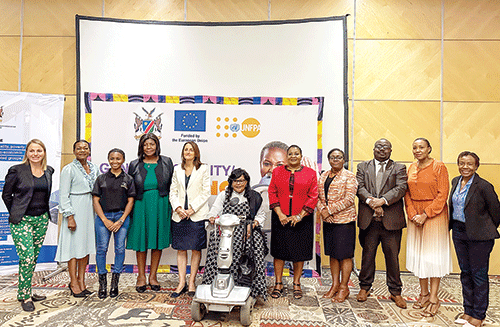Paheja Siririka
Imelda Munika
Nearly one in three Namibian women have experienced physical violence, while approximately one in four have endured sexual violence, UNFPA representative Ericka Goldson has said.
She added that gender-based violence remains a harsh reality in communities, disproportionately affecting the lives of women and girls.
“The statistics are alarming as these numbers represent not just data but the lived experiences of our fellow citizens, highlighting the urgent need for action and intervention,” said Goldson during the inception meeting for the Gender Equality/Combating Gender Based Violence 2024-2027 programme last Friday.
Goldson reaffirmed the commitment of the United Nations (UN) system in Namibia to combat gender-based violence and promote gender equality. As the UN sexual and reproductive health agency, she indicated that it is dedicated to achieving transformative results in collaboration with the government and partners.
“These results, which include ending preventable maternal deaths, ending unmet need for family planning, ending gender-based violence, and harmful practices, as well as sexual transmission of HIV, are the cornerstone of our efforts outlined in the UNFPA/Government,” she said.
The United Nations Population Fund (UNFPA), Ministry of Gender Equality, Poverty Eradication and Social Welfare as well as the European Union (EU) are working tirelessly to eradicate gender-based violence and promote gender equality in Namibia.
Enhanced coordination
Last Friday’s project inception meeting also witnessed the European Union (EU) contributing approximately N$28 million towards the implementation of the
project.
Focusing on preventing gender-based violence (GBV) and safeguarding the rights of women and girls, the project seeks to enhance coordination and service provision mechanisms. It aims to engage communities in preventing and responding to GBV, while improving data systems to inform evidence-based policies and programming.
At the same meeting, Nust student Joyce Waandja, representing the population that is often affected by gender inequality and gender-based violence, said there is a need to prioritise meaningful youth engagement, participation, and true empowerment to break the cycle of GBV.
“As a young woman, I believe it is important that our strategies for GBV prevention, response, and mitigation are inclusive, survivor-centered, and comprehensive,” she noted.
Waandja added: “Let us remember that the same communities that have problems are the same communities that have solutions for addressing GBV.”
Gender equality minister Doreen Sioka emphasised the urgent need to invest comprehensively in addressing the pervasive issue of GBV, which includes prevention, response, and mitigation strategies.
“GBV is not only a violation of human rights but also a barrier to achieving sustainable development and gender equality. Through investing in prevention, response, and mitigation, we uphold survivors’ rights and foster inclusive societies, requiring collective action and sustained commitment,” said Sioka in a statement read on her behalf by her deputy for disability affairs Alexia Manombe-Ncube.
She stated that in 2022, the Namibian Police Force recorded 5 356 GBV related cases of which 1 378 accounts for rape cases, indicating the need to work together to reduce incidences of GBV.
EU Ambassador to Namibia Ana Beatriz Martins also reiterated her organisation’s commitment to combating GBV and promoting gender equality in Namibia, noting that gender equality and women’s empowerment are core values of the EU and a key priority in its internal and external policy.
“The EU’s new Action Plan on Gender Equality 2020–2025, which is the main cornerstone of our gender mainstreaming efforts has identified gender equality, women’s empowerment, peace and security as cross-cutting issues to be included in all EU policies, strategies, and projects,” stated Martins.
She added: “Human rights are at the heart of EU relations with other countries and regions. Here in Namibia, EU policy includes promoting the rights of women and children, as well as promoting economic, social and cultural rights. We also invest heavily into Early Childhood Education, the very basis for strong human development.”
The project, which will run from 2024 to 2027, underscores a collective commitment to support Namibia in combating gender-based violence at both national and subnational levels with a focus on strategic interventions in critical regions, such as Zambezi, Ohangwena, Khomas, Kunene, and Omaheke as well as addressing identified gaps in the National Gender Policy and the National GBV Plan of Action.


